“What is the best dog whistle to stop barking?” In this blog, I will discuss this popular dog training myth and the best alternatives that ACTUALLY work.
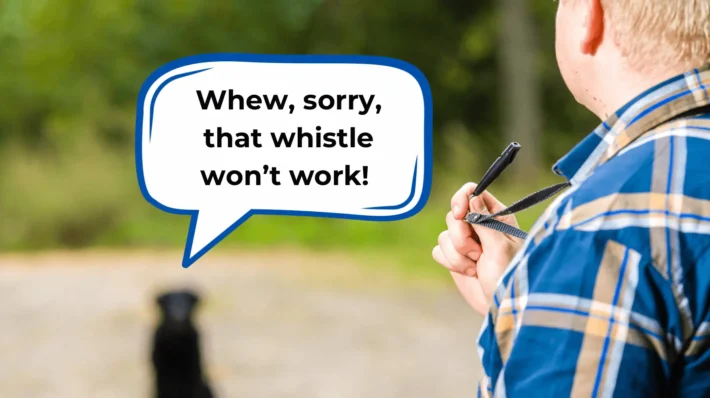
Let me be upfront: relying on a whistle to stop a barking behavior is setting yourself and your dog up to failure. A whistle isn't the ultimate solution.
But would I still recommend you to get one? Absolutely! They can be a fantastic tool to have, especially if you have a dog who’s a little out of control, doesn’t listen to you, or gets up to mischievous things. But is a whistle enough to stop a dog barking continuously?
But should you put all your trust on this device? Read on, let's debunk this dog training myth.
Key Takeaways
- Dog whistles are a useful training tool, not a magical solution to stop barking. While they can be effective for recall training and gaining your dog's attention, they won't automatically stop a dog from barking, especially a neighbor's dog.
- Addressing the root cause of barking is crucial. Whether it's separation anxiety, lack of exercise, or a protective instinct, understanding why a dog barks is the first step towards resolving the issue. Training, behavior modification, and ensuring your dog's well-being are far more effective than relying on quick fixes like anti-bark collars or whistles.
- Positive reinforcement and leadership are key to a well-behaved dog. Building a strong bond with your dog, establishing yourself as the leader, and using positive reinforcement techniques will help prevent unwanted behaviour like excessive barking. Remember, a happy and well-adjusted dog is less likely to bark excessively in the first place.
Understanding Dog Whistles

Dog whistles — they've got this almost mythical reputation, right?
Some dog owners think a dog whistle is like a magical tool only dog whisperers know about. Truth is, they're pretty straightforward. Just think of them as high-pitched whistles you blow into. Sometimes you can hear the sound, sometimes you can't. Some are pitched so high that they're beyond human hearing range. The amazing thing is dogs can hear them loud and clear.
Humans and dogs have different hearing capabilities. We're tuned into certain frequencies, our dogs are tuned into others. It makes sense that our dogs can pick up on sounds we might miss entirely. Some dogs just have extra sensitive hearing. This impressive sense of dogs is what makes dog whistles work! Farmers and trainers have been using special whistles for ages to communicate with their working dogs.
Using a dog training whistle comes with no magic; just clever use of science. Using a whistle for training can do wonders for your training. Stick around, and I'll explain exactly how they work and when you might want to use one yourself.
THIS FREE WEBCLASS WILL HELP YOU STOP DOG BARKING FASTThe Myth of Whistle Training to Stop Barking Dogs
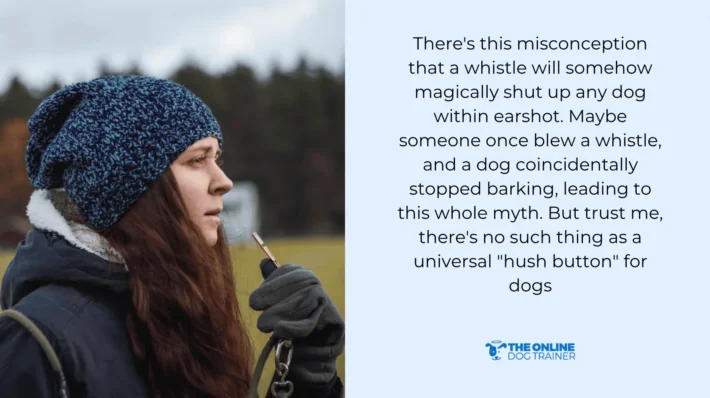
Okay, let's get real about dog whistles.
Dear dog owner, this post isn't about magically silencing your neighbor's yappy pooch (sorry, that's just not how it works). Instead, we're talking about how whistles can be a seriously useful tool for training your own dog and curbing their barking.
See, there's this misconception that a whistle will somehow magically shut up any dog within earshot. Maybe someone once blew a whistle, and a dog coincidentally stopped barking, leading to this whole myth. But trust me, there's no such thing as a universal “hush button” for dogs, especially not ones you don't even own.
While a dog might stop barking if they're startled or even hurt by a loud whistle, this is not an effective or ethical solution. Imagine how you'd feel if someone blasted a whistle at your dog to stop them from barking!
So, what are whistles good for? Well, they can be fantastic for dogs who are a bit unruly, have selective hearing, or just love getting into mischief. They offer a clear, consistent signal that cuts through distractions and helps you get your dog's attention, even from a distance.
Myth: The Right Whistle Can Completely Stop a Dog's Barking Issue

Let's clear the air about this whole “whistle to stop a dog barking” thing. It's mostly a myth, plain and simple.
Dogs aren't robots; they won't just shut up from constant barking because they hear loud sounds. Sure, extreme pain might make them stop momentarily, but that's cruel and definitely not the way to go.
Causing a dog pain through loud noises to quiet them down is never okay. And let's be honest, there's no guarantee a whistle will even work, especially on a neighbor's dog.
Think about it: that barking dog might be suffering from separation anxiety or some other distress. Blasting a whistle at them won't solve the underlying problem; it might even make things worse.
Instead of resorting to quick fixes that could harm a dog, let's focus on a more effective method: understanding and addressing the root cause of their barking to change unwanted behavior. If it's a neighbor's dog, maybe a friendly conversation could lead to solutions that benefit everyone.
FREE WEBINAR: FINALLY ADDRESS DOG BARKING ISSUES FOR GOODThe Proper Use of A Dog Whistle
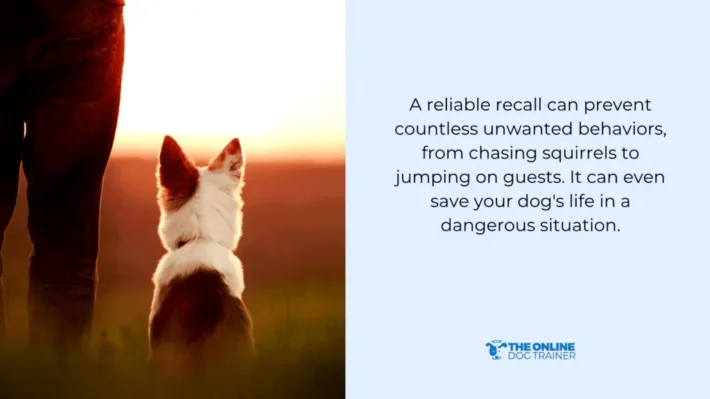
How Can Proper Training Recall and A Good Dog Whistle Help?
The recall command is the holy grail of dog training. It's that magical moment when your dog, no matter how distracted or far away, hears your call and comes racing back to you. A reliable recall can prevent countless unwanted behaviors, from chasing squirrels to jumping on guests. It can even save your dog's life in a dangerous situation.
How a Whistle Transforms Recall Training
A dog whistle isn't just another noisemaker. It's a game-changer for teaching the recall command.
Here are some reasons why:
Reason #1: Cuts Through the Noise
Your voice can get lost in the hustle and bustle of the world. A whistle's sharp, distinct sound pierces through distractions, ensuring your dog hears you even in a crowded park or busy street.
Reason #2: A New Stimuli To Respond To
Let's face it: your dog might be a bit “deaf” in your voice by now. They've heard it all: from gentle calls to frustrated shouts. A whistle offers a clean slate, a new sound they associate solely with positive reinforcement and coming back to you.
Reason #3: Breaks Through the Boredom
Dogs are smart. If they've heard their name a thousand times with no exciting consequence, they might tune it out. A whistle, especially when used sparingly, grabs their attention and sparks curiosity.

Recall Training Tips: From Living Room to Real World
Tip #1: Start Simple
Begin training at home in a quiet environment. Blow the whistle, reward your dog instantly when they come, and repeat.
Tip #2: Build Excitement
Make coming to you the best part of your dog's day! Use high-value treats and enthusiastic praise to create a positive association with the whistle.
Tip #3: Gradual Progression
Increase the distance and distractions gradually. Practice in different locations, starting with familiar, low-distraction areas and working your way up to more challenging environments.
Tip #4: Save it for Special Occasions
Don't overuse the whistle. Reserve it for crucial moments when you need your dog's undivided attention.
Dealing With a Neighbor's Barking Dogs
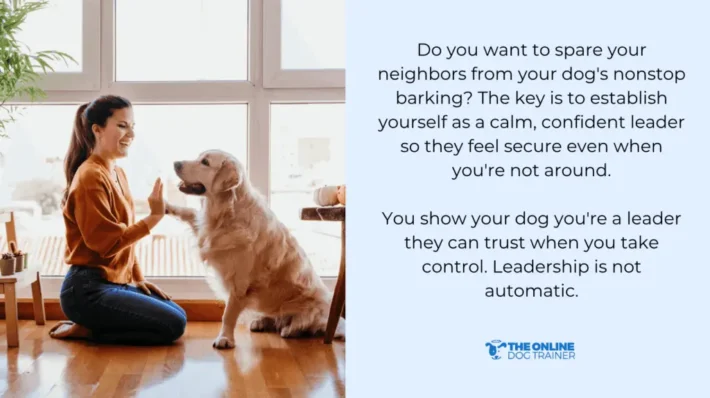
One of the trickiest things about a neighbor's barking dog is that they often don't even realize it's happening. No one wants a constantly barking dog, so if the owner is home, they'll likely try to quiet them down. However, the real issue often arises when the owner leaves, and the dog starts barking out of loneliness or anxiety. This can be incredibly frustrating for neighbors.
Before you call the police, or upset the people next door (especially if they are your new neighbors), you can talk to them about their pets' barking tendencies. If you already know the solution (which I'm going to share below), you can also share it to them.
Do you also want to spare your neighbors from your dog's nonstop barking? The key is to establish yourself as a calm, confident leader so they feel secure even when you're not around.
Luckily, there are ways to address this kind of barking, often stemming from separation anxiety. Dogs with separation anxiety might feel overly responsible and become stressed when their owner leaves.

You show your dog you're a leader they can trust when you take control. Leadership is not automatic. If your dog sees you taking control of the food, affection, threats and dangers, and outdoor walks, they'll respect you. I talk more about earning leadership through the Five Golden Rules of leadership. I also talk about these extensively in my Five Golden Rules blog series.
Let's go back to separation anxiety in dogs. Not sure if your dog has separation anxiety? Observe their behavior when you return home. If they're exhausted and not interested in playing, they were likely stressed the entire time you were gone.
Another common reason for barking is territorial behavior. If your dog can see through the fence, they might bark at anything that moves. Sometimes, simply blocking their view can make a big difference.
NO MORE BARKING HEADACHES. GRAB YOUR SEAT IN THIS FREE WEBCLASS!A Word of Caution: Avoid Anti-Bark Collars
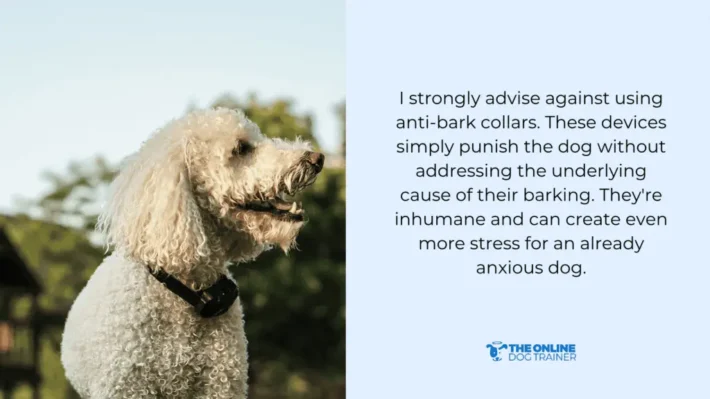
I strongly advise against using anti-bark collars. These devices simply punish the dog without addressing the underlying cause of their barking. They're inhumane and can create even more stress for an already anxious dog.
If you truly care about your dog's well-being, I recommend exploring solutions that address the root cause of their barking. Consider resources like the “Dog Calming Code” to help your dog feel happier, calmer, and easier to manage. It's a win-win for both you and your furry friend!
For Dog Owners: Alternatives to Dog Training Whistle
As we've discussed, addressing the root cause of barking through behavior modification and professional training is the most effective and compassionate approach. Anti-bark collars are simply not a humane or sustainable solution.

Another factor to consider is whether your dog is getting enough exercise. Pent-up energy can sometimes lead to excessive barking. However, it's important to remember that boredom is often not the primary culprit. Barking is frequently a sign of deeper issues like anxiety, reactivity, or a strong protective instinct.
By understanding the underlying reasons for your dog's barking, you can tailor your training and management strategies to meet their specific needs. Remember, a happy and well-adjusted dog is less likely to bark excessively in the first place. So, prioritize positive reinforcement, provide plenty of exercise and mental stimulation, and seek professional guidance if needed. Your furry friend will thank you for it!
FINALLY, PEACE & QUIET. JOIN OUR FREE DOG BARKING WEBCLASS TODAY!Before Giving a Noise Complaint, Reach Out To Your Neighbors First
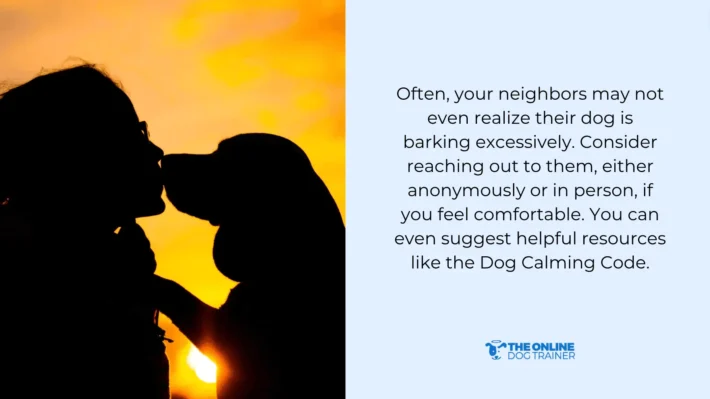
I always recommend a humane approach, starting with communication. Often, your neighbors may not even realize their dog is barking excessively. Consider reaching out to them, either anonymously or in person, if you feel comfortable. You can even suggest helpful resources like the Dog Calming Code or professional training to address the root cause of the barking on your neighbor's property.
LEARN THE DOG CALMING CODE FOR FREEThe Doggy Dan Dog Whistle
Choosing the perfect dog recall whistle can be overwhelming. Trust me, I've been there – I've tested countless professional dog whistles in my career as a dog trainer.
I always recommend a whistle that truly delivers. That's why I created my own: a dog whistle designed to solve the recall problems that so many dog owners face.
The Doggy Dan dog whistle has a range of up to 500 feet. Your dog will easily recognize its clear, distinct sound. The sound cuts through everyday noise. It has a distinctive frequency that makes it easy for dogs to associate the sound with recall training. You'll love the design; it's simple and easy to carry.
Harnessing the Power of the Whistle for Your Own Dog
While whistles won't magically silence other dogs, they can be incredibly valuable for training your own dog.
My Doggy Dan dog whistle, combined with my online training program, can be particularly effective for teaching the recall command. This means your dog will come back to you reliably, even when distracted or tempted to chase something. It's a powerful tool for curbing unwanted behaviors like barking at objects, chasing birds, or ignoring your calls.
Remember, a whistle is just one tool in your training arsenal.
When you pair your dog whistle with the right training and strategies, you can curb your dog's barking behavior!
FAQs
What sound silences a barking dog?
Well, there's no single magic sound that'll instantly hush every barking dog. Some pet owners might claim a loud whistle does the trick, but honestly, that's more likely to startle or even hurt the dog than actually solve the barking problem. The best way to quiet a barking dog is to address the reason they're barking in the first place. That could mean training, more exercise, or even addressing underlying anxiety.
Why does my dog bark when I whistle?
That's a bit of a head-scratcher, isn't it? Dogs usually associate whistles with positive things, like coming back to you for a treat. If your dog's barking when you whistle, it might be confused or even a little anxious. Try using a different whistle sound or pairing the whistle with a super tasty treat to create a more positive association.
How do I get my dog to respond to a whistle?
Training your dog to respond to a whistle is all about positive reinforcement. Start by blowing the whistle and immediately giving your dog a treat when they look at you or come closer. Keep practicing in short, fun sessions, gradually increasing the distance and distractions. Before you know it, your dog will be coming running at the sound of your whistle!
How do you use a dog whistle to stop barking?
Trick question! Dog whistles aren't meant to stop barking directly. They're primarily used for recall training – teaching your dog to come back to you when called. However, a reliable recall can indirectly help with barking. If your dog is barking at something, you can use the whistle to get their attention and redirect them to a more positive behavior.
Do dog whistles silence barking dogs?
Nope, that's a myth. Some folks might think a whistle can magically shut up any dog, but that's just not true. Remember, barking is a form of communication for dogs. If they're barking, it's usually for a reason. Instead of trying to silence them with a whistle, focus on understanding why they're barking and addressing the underlying cause.
What are pealess whistles and silent whistles?
Pealess whistles are a type of whistle that produce a consistent pitch regardless of how hard or soft you blow into them. This makes them ideal for dog training, as the consistent sound is less likely to confuse the dog. Additionally, pealess whistles are incredibly loud, capable of being heard from up to two miles away, making them effective for recall training even at long distances.
DITCH THE DIN. UNLOCK A PEACEFUL HOME IN OUR FREE WEBCLASS!
~Doggy Dan 🙂





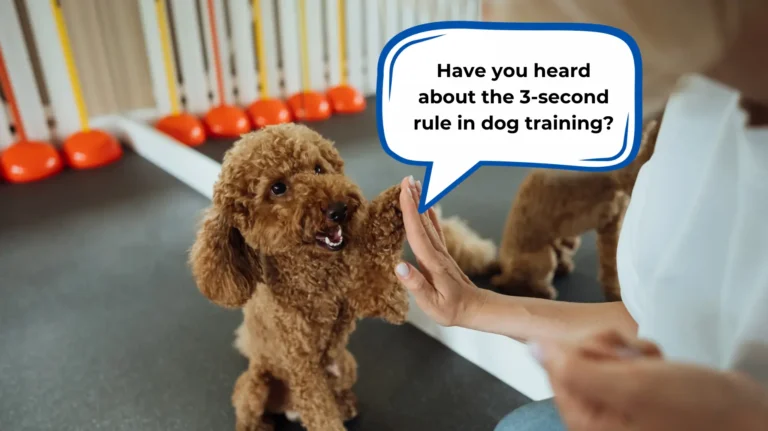

4 Responses
Valid point saying it wasn’t a good way to breakthrough to a scared dog. So I have tried to just ignore and that hasn’t made any changes either. My mom and I have had several conflicts about the pup and now I just avoid being around. I also tried giving a treat Everytime I walked in even when she was barking and that goes against my instinct of rewarding an incorrect behavior. Now she barks at me wagging her tail. Uhg! I do have a dominant and apparently threatening energy. What can I do?
Check out the free webinar, you’ll love it!
The Reactivity Webinar happens weekly on Wednesday and Sunday at 3pm EST (USA time). The link for the webinar is here, and you can choose this week or the following week: https://theonlinedogtrainer.com/reactivity-ewebinar-register/
If you register, you’ll get the recording via email after the webinar
I recently have had to temporarily move in with my mother and she had gotten a puppy several months prior. The dog is about 9 or 10 months old now. She instantly upon my arrival 3 months ago decided I was the one to bark at, always, Everytime I’m in her sight. At first I tried to be friendly and coax her but she is skittish and won’t let many touch her. So I tried treats and she approaches, takes treat and retreats to safe distance. After a few days of no change in the barking at me I tried using a squirt bottle. My mother wasn’t having any of that. She did make a
Check out the free webinar, you’ll love it!
The Reactivity Webinar happens weekly on Wednesday and Sunday at 3pm EST (USA time). The link for the webinar is here, and you can choose this week or the following week: https://theonlinedogtrainer.com/reactivity-ewebinar-register/
If you register, you’ll get the recording via email after the webinar